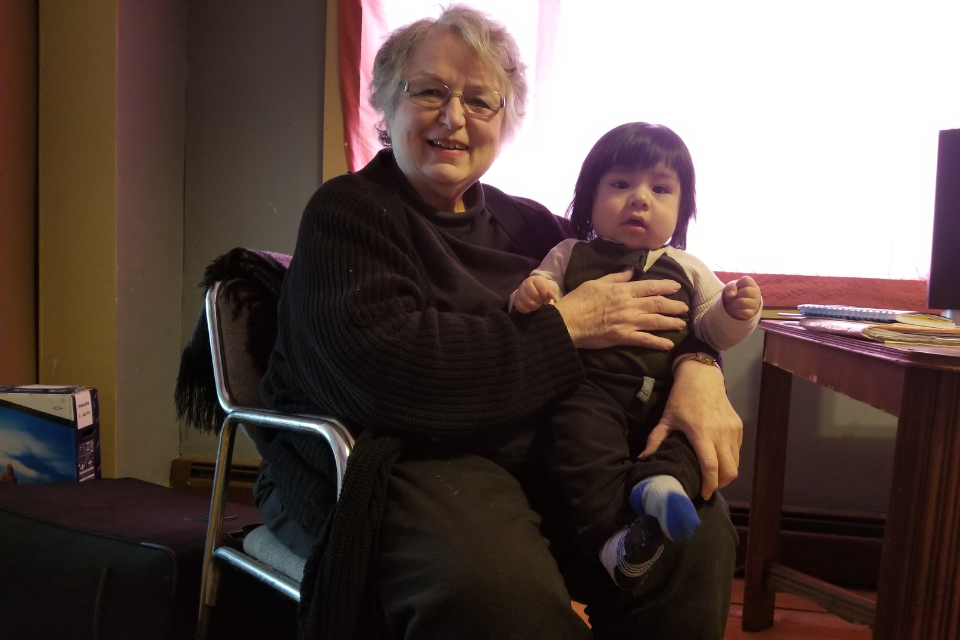Resolutions for three social justice issues were adopted by The Michigan Conference at Annual Conference. Practical next steps for advocacy are outlined for addressing gun violence, cancellation of federal student loan debt, and supporting immigrant driver’s licenses and state I.D.s.
ALICE FLEMING TOWNLEY
Mission and Justice Coordinator, Michigan Conference
“Who are you most likely to listen to—a stranger, or someone you know? And will you listen more carefully if they want to talk about one issue, or a long list?” asked Ellen Hoekstra as she began to teach me advocacy skills.
Ellen has long been an advocate and leader in Lansing. Ellen believed that I, her preacher, had a voice that needed to be heard beyond the pulpit, and with those forming public policy. Ellen’s encouragement persuaded me, and she expanded her lessons with training events at our church and throughout the community.
As we come home from annual conference with several resolutions involving advocacy, her words come back to me.
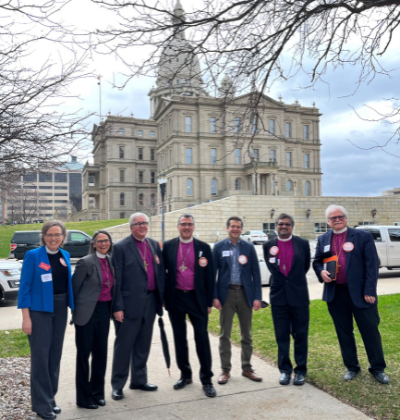
Getting started in advocacy begins by developing relationships with elected officials in your area. Perhaps it’s an official on a local school board or township board, or a city council member or county commissioner, or state or national legislators?
If these officials have public events, such as coffee hours, attend. This spring, State Representative Kelly Breen thanked a room full of faith leaders, including myself, for coming to her office. When I asked her how we could support her in her efforts at reducing gun violence, she said, “Please continue, as people of faith speaking on this issue and encourage others to do the same.” She added, “Come to my coffee hours. Sometimes no one shows up.”
Representative Breen went on to add how much it meant to have people of faith present and supportive in these conversations. It reminded me of Ellen Hoekstra’s advice on the importance of forming relationships in advocacy work.
Another state representative shared with me that follow-up thank-you notes mean a great deal to her. To be appreciated and supported for acts of courage can renew strength. Our voices are needed and valued. Let us continue learning how to share them in ways we can be heard.
Who might you reach out to? What can you thank them for? How and when might you make a request?
Consider these three areas of advocacy passed at annual conference, and then think through how you might get involved and take next steps. The hope is that the movement, and the conversations, might continue long after annual conference.
Addressing Gun Violence, #2022-16
This resolution called on The Michigan Conference leadership, including congregations, clergy and laity, to take action to address the rise in gun violence. Writers of this legislation and the Board of Justice will be gathering resources for churches to use, as well as planning a social justice advocacy day for next March.
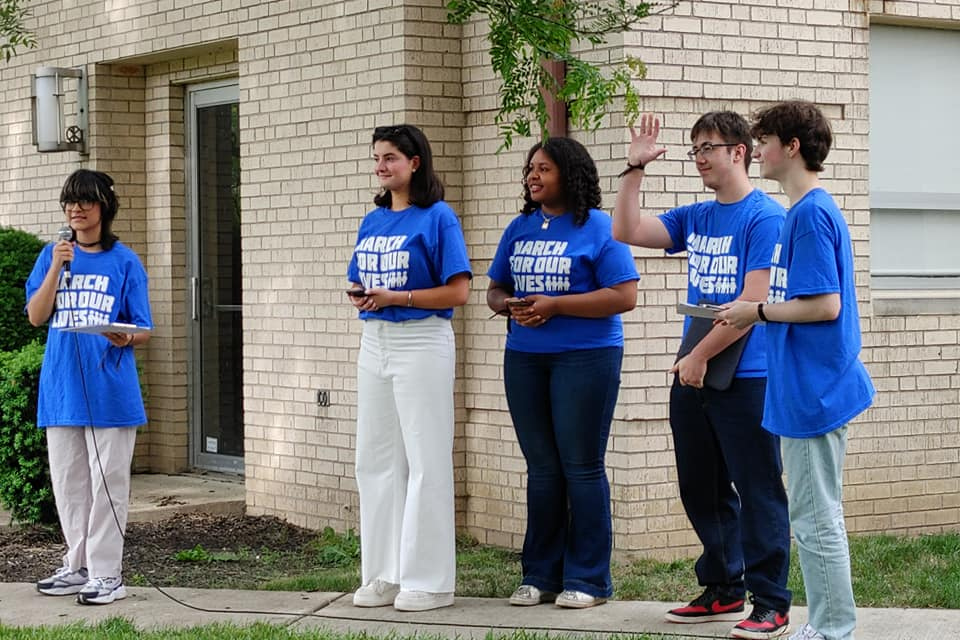
Get started now by exploring these resources:
-
- The End Gun Violence Now Campaign, a coalition including many faith leaders across Michigan, is organizing advocacy and events.
- The Gun Violence Reduction Sabbath Resource Packet, from the Interfaith Action SW Michigan Peace and Justice Collaborative, contains ideas for worship, prayer vigils and action.
- The General Board of Church and Society (GBCS) of the United Methodist Church has a Bible study, fact sheets, and advocacy resources.
- The Wisconsin Council of Churches has published a Faith & Gun Violence Study and Action Guide, in addition to other practical resources for individual and congregational use.
Think about what your church might do, and then tell others. On May 29, Nardin Park UMC displayed 21 empty chairs on the church lawn in honor of the 21 lives lost in Uvalde, and lives lost in Buffalo and California and daily due to gun violence. Rev. Melanie Carey preached about lament and turning mourning into action.
High school students reached out to Nardin Park UMC to host the Oakland County Chapter of March for Our Lives on June 11. Rev. Melanie Carey and church leaders were grateful to host them along with members of the community and elected officials. Together they are forming a network of supportive relationships.
To connect with leaders in this effort, contact Heather McDougall-Walsh, chaplainheathermcdougall@gmail.com.
Addressing Cancellation of Federal Student Loan Debt, #2022-5
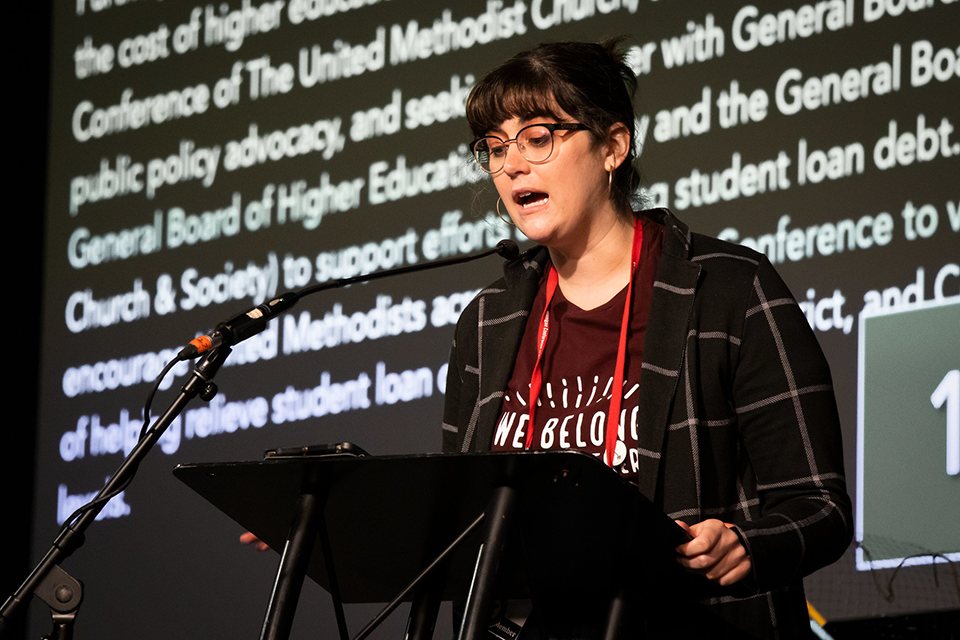
“The Board of Young People’s Ministry hopes Annual Conference was the starting point for the conversation about student loan debt in our Conference, so we can grow creative ways to both relieve student debt and advocate for lowering the cost of higher education,” says resolution author Elizabeth Hurd.
As this conversation continues, Elizabeth says that Michigan United Methodists can contact elected officials and the two United Methodist agencies that relates to this issue. She has provided a letter template and instructions that you can download here.
Get started now by contacting elected officials and connecting with United Methodist agencies:
To connect with leaders in this effort, contact Elizabeth Hurd, pastor@westbloomfield.org.
Supporting Immigrant Driver’s Licenses/State I.D.s, #2022-10
The Conference Committee on Hispanic/Latino Ministries is asking everyone to contact their state legislators to voice their support for the reinstatement of the ability to obtain a driver’s license and state I.D.s for all residents. Also, ask the Michigan legislature to support the passage of the Drive SAFE (Safety, Access, Freedom, and Economy) Bills.
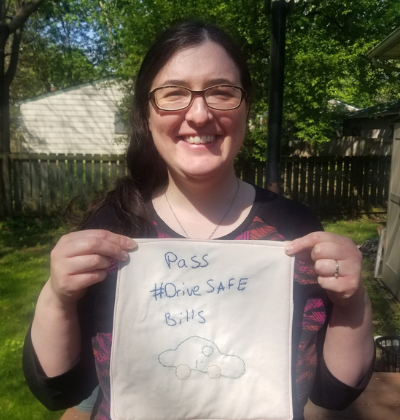
Get started now by contacting legislators and exploring these resources:
-
- Find your Michigan senators and representatives by clicking here.
- Review the advocacy action steps on the Drive Michigan Forward website.
Patsy Coffman, volunteer coordinator for the Neighbor’s English as a Second Language Ministry at Elsie UMC, says that in one month’s time, there is a need for transportation at least 22 times. Most of those transportation needs are for prenatal care, medical appointments, education, bill payments, and legal services. Patsy explains, “Because our ESL students work and live on farms, they, by necessity, have to drive several miles just to get food for their families. Driving without a license puts them at risk for expensive tickets, jail, and sometimes, deportation. These essential workers, as they are considered, deserve as a matter of justice to have driver’s licenses.”
Sonya Luna, Coordinator of Latinx Ministries for The Michigan Conference, adds, “Think about all the times that you have needed a driver’s license not only for transportation but also for identification purposes, just in a week. You can act today so that all residents in Michigan have access to this basic need.”
To connect with leaders in this effort, contact Sonya Luna, sluna@michiganumc.org.
Last Updated on October 31, 2023

